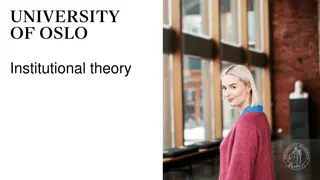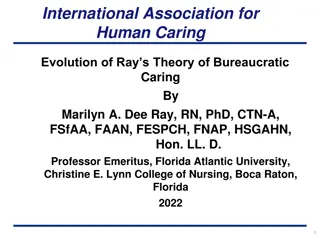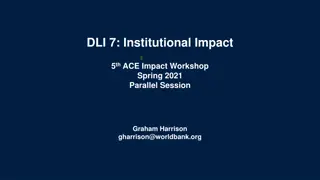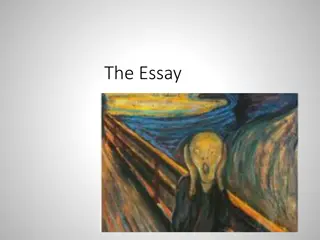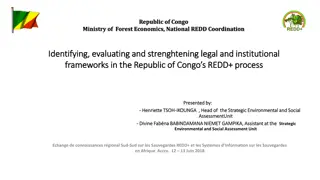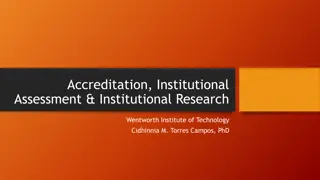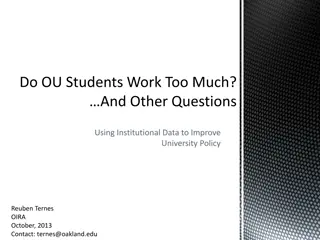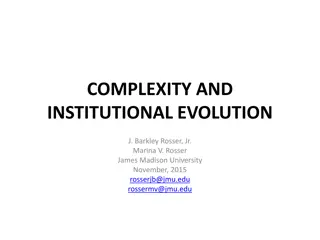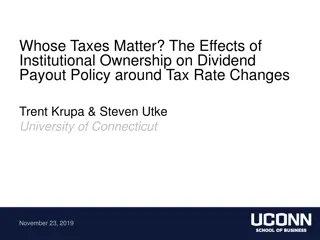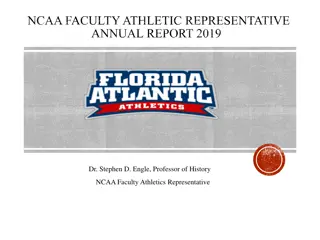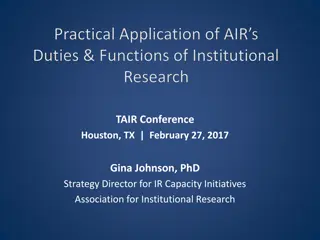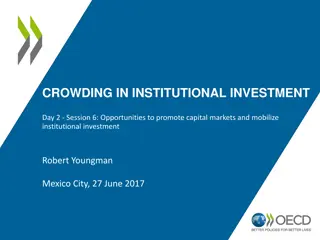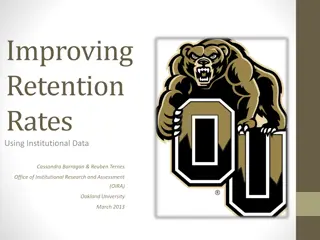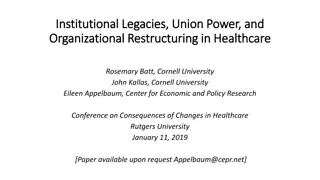INSTITUTIONAL GOVERNANCE FRAMEWORK
Currently, there is a lack of formal structure in the Institutional Housing Governance Framework (IHGF) within the public service system, leading to inefficiencies in managing institutional housing policies. This absence has resulted in deteriorating state assets, unmet housing demands, and ineffect
0 views • 17 slides
Ginzburg Landau phenomenological Theory
The Ginzburg-Landau phenomenological theory explains superconductivity and superfluidity as distinct thermodynamic phases. It focuses on phase transitions characterized by singularities in specific heat at the transition temperature. Derived from BCS theory, it quantifies condensation energy, emphas
1 views • 38 slides
Crystal Field Theory in Transition Metal Complexes
Crystal Field Theory (CFT) explains the colors and magnetic properties of transition metal complexes. It focuses on the energy changes in d-orbitals of metal ions caused by surrounding ligands. This theory, developed in 1929, provides insights into the bonding interactions in complex compounds. The
10 views • 44 slides
Understanding Social Learning Theory and the Power of Example
Social Learning Theory, introduced by Bandura, emphasizes learning through observation and modeling. It explores how individuals acquire behavioral dispositions, trial-and-error experiences, and the impact of stimuli in the environment. The theory focuses on the importance of attention, retention, a
1 views • 17 slides
Understanding Institutional Theory and Organizations
Explore the concept of institutional theory, which focuses on the stability and change of institutions and organizations. Learn about institutionalization, deinstitutionalization, and reinstitutionalization, as well as the definitions of institutions and organizations. Discover how institutions like
0 views • 35 slides
Evolution of Mathematical Theories and Proof Systems
Development of mathematical theories such as model theory, proof theory, set theory, recursion theory, and computational complexity is discussed, starting from historical perspectives with Dedekind and Peano to Godel's theorems, recursion theory's golden age in the 1930s, and advancements in proof t
1 views • 29 slides
Introduction to Organizational Behavior: Management Theories and Practices
Explore the evolution of organizational behavior from early management theories to contemporary practices. Understand the historical foundations and relevance of management theory in shaping workplace dynamics. Delve into key concepts like Scientific Management, Administrative Management, Bureaucrat
1 views • 28 slides
Theories on the Origin of State: Divine, Force, Patriarchal, and More
Various theories such as Divine Origin, Force Theory, Patriarchal Theory, and others explain the origin of the state. Divine theories attribute state creation to God, while Force Theory emphasizes the strong subjugating the weak to establish authority. Each theory offers unique perspectives on the h
1 views • 24 slides
Understanding Forgetting: Theories and Influence on Memory Recall
Forgetting is a complex phenomenon influenced by theories such as Decay Theory, Interference Theory, and Motivated Forgetting. The Ebbinghaus forgetting curve highlights how memories fade over time. Decay Theory suggests memories decay over time, while Interference Theory explains how old and new me
0 views • 25 slides
Psychological Theories of Criminality: Understanding the Roots
Psychological theories of criminality delve into the association between intelligence, personality, learning, and criminal behavior. Major theories include Psychodynamic Theory by Freud, Behavioral Theory by Bandura, and Cognitive Theory by Kohlberg. These theories explore how unconscious mental pro
1 views • 20 slides
Evolution of Bureaucratic Caring Theory in Nursing
Discussion of the Theory of Bureaucratic Caring by Marilyn A. Dee Ray, focusing on the systematic integration of purposeful concepts and the development process of the BCT model. The research explores the meaning of caring within institutional culture using methodologies like ethnography and phenome
0 views • 29 slides
Understanding the Theory of Firms: Neoclassical vs. Modern Approaches
The theory of firms is explored through the Neoclassical and Modern perspectives. Neoclassical theory focuses on profit maximization, while Modern theory delves into managerial, principal-agent, and transaction cost theories. The discussion covers criticisms of Neoclassical theory and the essential
1 views • 79 slides
Theories of Causation in Psychological and Social Sciences
Overview of theories of causation categorized into psychological, social psychological, and sociological perspectives. Psychological theories focus on instinctive, biological, and psychological qualities of abusers, including Attachment Theory, Psychodynamic Theory, Social Learning Theory, and Situa
0 views • 15 slides
Understanding Political Theory through a Contextual Approach
Exploring G.H. Sabine's perspective on political theory through a contextual approach, emphasizing the importance of historical context and societal influences. Sabine argues that while political theory evolves with its contemporary politics, it should be analyzed within its specific time and social
0 views • 9 slides
Evolution of Light Theory: From Wave Theory to Quantum Theory
At the turn of the century, the discovery of the photoelectric effect challenged the wave theory of light, leading to the development of the quantum theory by Max Planck and Albert Einstein. This new theory introduced the concept of discrete energy units known as quanta, bridging the gap between wav
1 views • 62 slides
Maximizing Institutional Impact through ACE Centers of Excellence
ACE Impact Centers of Excellence benefit from strong institutional support and are crucial for catalyzing broader teaching and research excellence. The DLI.7 framework outlines various elements that support global best practices in Higher Education, emphasizing the importance of institutional owners
0 views • 17 slides
Dp-branes, NS5-branes, U-duality, and M-Theory Overview
Overview of Dp-branes, NS5-branes, and U-duality derived from nonabelian (2,0) theory with Lie 3-algebra. Introduction to M-theory, including M2-branes and M5-branes in the strong coupling limit. Discussion on BLG theory, Lorentzian Lie 3-algebra, and the ABJM theory for M2-branes.
1 views • 32 slides
Understanding Time-Independent Perturbation Theory in Quantum Mechanics
Perturbation theory is a powerful tool in solving complex physical and mathematical problems approximately by adjusting solutions from a related problem with known solutions. This theory allows for more accurate approximate solutions by treating the difference as a small perturbation. An example inv
0 views • 19 slides
Ethical Theories: Divine Command vs. Virtue Theory Explained
Divine Command Theory asserts that morality is derived from God's commands, contrasting with Virtue Theory which focuses on developing moral virtues to achieve human flourishing and excellence. Divine Command Theory relies on religious texts, while Virtue Theory emphasizes the cultivation of virtues
0 views • 24 slides
Exploring Civic Virtue and Institutional Design in Early Modern Governance
Delve into the complexities of civic virtue and institutional design in early modern governance through a 3,000-word essay. Analyze the necessity of civic virtue within the state and consider contrasting perspectives on whether institutional design can replace it. Use primary texts to support your a
0 views • 32 slides
Understanding Fermi Liquid Theory in Interacting Fermion Systems
Fermi liquid theory, also known as Landau-Fermi liquid theory, is a theoretical model that describes the normal state of metals at low temperatures. Introduced by Landau and further developed by Abrikosov and Khalatnikov, this theory explains the similarities and differences between interacting ferm
0 views • 23 slides
Impact of UN Guidelines on Foster Care and Institutional Care of Young Children in Europe and Central Asia
Professor Kevin Browne and Dr. Shihning Chou conducted a study on the impact of UN guidelines on foster care and institutional care of young children in Europe and Central Asia. The research highlights the physical harm and neural damage caused to children in institutional care without a parent. It
0 views • 11 slides
Strengthening Legal and Institutional Frameworks for REDD+ in Republic of Congo
The Ministry of Forest Economics in the Republic of Congo, along with the National REDD Coordination, is actively identifying, evaluating, and strengthening the legal and institutional frameworks for the REDD+ process. Progress reports highlight the establishment of institutional arrangements, imple
0 views • 10 slides
Institutional Assessment & Research at Wentworth Institute of Technology
Wentworth Institute of Technology excels in accreditation, institutional assessment, and research. The institution's leadership program oversees accreditation efforts to ensure educational effectiveness. They focus on assessing student learning outcomes, measuring educational effectiveness, and cond
0 views • 5 slides
Institutional Assessment and Effectiveness Workshop Achievements at SUNY Oneonta
The Office of Institutional Assessment and Effectiveness at SUNY Oneonta has made significant progress in developing assessment protocols and processes, leading to a culture of assessment. This includes completing planning and assessment cycles, establishing objectives and procedures, and aligning u
1 views • 16 slides
Understanding the Political Context of Public Health in New Zealand
This paper delves into the political landscape of public health in New Zealand, emphasizing the importance of analyzing political influences to enhance public health initiatives. It explores various theories such as Interest Group Theory, Institutional Theory, and Theory of Political Economy to unde
0 views • 20 slides
Computational Learning Theory: An Overview
Computational Learning Theory explores inductive learning algorithms that generate hypotheses from training sets, emphasizing the uncertainty of generalization. The theory introduces probabilities to measure correctness and certainty, addressing challenges in learning hidden concepts. Through exampl
0 views • 43 slides
Automata Theory and Theory of Computation Overview
This course overview covers concepts in automata theory and theory of computation, including formal language classes, grammars, recognizers, theorems in automata theory, decidability, and intractability of computational problems. The Chomsky hierarchy, interplay between computing components, modern-
0 views • 42 slides
Theories of Interest in Microeconomics II
Explore various theories of interest in economics, including the Classical Theory, Liquidity Preference Theory by Keynes, Productivity Theory, Abstinence Theory, Time-Preference Theory, Fisher's Time Preference Theory, and the Loanable Fund Theory. These theories offer different perspectives on the
0 views • 6 slides
Utilizing Institutional Data to Enhance University Policy: Insights from Oakland University Research
Extracting valuable insights from institutional data, the Office of Institutional Research and Assessment at Oakland University conducts various research activities to improve university policy. Through surveys and internal research, they address important questions like student workload, financial
0 views • 18 slides
Exploring the Evolution of Atomic Theory
Delve into the historical journey of atomic theory starting from Democritus and Aristotle's views to modern advancements proving some aspects of Dalton's theory incorrect. Learn about key laws and theories such as the Particle Theory of Matter, Dalton's Atomic Theory, and JJ Thomson's discoveries, s
0 views • 30 slides
Institutional Effectiveness and Assessment at B-CU
Jennifer Dash, Director of Institutional Assessment, and Dorian Hooks, Institutional Assessment Coordinator at B-CU, lead the efforts in understanding institutional effectiveness and assessment. Capacity building, creating a common vision, and a framework for institutional effectiveness are highligh
0 views • 35 slides
Complexity and Institutional Evolution in Economics
This paper explores the relevance of complexity theory in studying economic institutional evolution, focusing on the concepts of cumulative causation, increasing returns, and hierarchical emergence. It discusses the dynamic and computational complexity theories, highlighting the role of systems foll
0 views • 24 slides
Effects of Institutional Ownership on Dividend Payout Policy
This study examines how a firm's ownership structure, particularly institutional ownership, influences its dividend policy around tax rate changes. It explores the impact of tax-sensitive/insensitive institutional ownership, the role of dedicated institutions as monitors, and the interaction between
1 views • 26 slides
NCAA Faculty Athletics Representative Annual Report 2019
Dr. Stephen D. Engle, a Professor of History, serves as the NCAA Faculty Athletics Representative (FAR) and Chair of the Inter-Collegiate Athletic Committee. The report outlines the general responsibilities of the FAR, including overseeing sub-committees on Academic Performance, Institutional Contro
1 views • 13 slides
Role and Functions of Institutional Research in Higher Education
This content discusses the importance of developing duties and functions for Institutional Research (IR) professionals in higher education institutions. It highlights the key responsibilities of IR, such as identifying information needs, collecting and analyzing data, serving as data stewards, and e
0 views • 21 slides
Opportunities to Mobilize Institutional Investment in Capital Markets
Aligning trillions of dollars managed by OECD institutional investors towards green infrastructure investments presents a significant opportunity. Currently, only a small percentage of large pension fund assets are directed towards infrastructure, with an even smaller fraction allocated to green pro
0 views • 4 slides
Enhancing Student Retention Rates through Institutional Data Analysis
Explore how Oakland University's Office of Institutional Research and Assessment leverages various data sources, policy analysis, and predictive modeling to improve student success and retention. Discover the role of IR offices, available resources, survey data, and the importance of collaboration f
0 views • 33 slides
Macromechanical Analysis of Lamina and Tsai-Hill Failure Theory Overview
The Tsai-Hill failure theory is based on the strengths of a unidirectional lamina, incorporating longitudinal and transverse tensile and compressive strengths, as well as in-plane shear strength. This theory, derived from the distortion energy theory, provides criteria for determining lamina failure
0 views • 15 slides
Examining Union Power and Institutional Legacies in Healthcare Organizational Restructuring
Challenges faced by healthcare unions due to institutional legacies and shifts in the healthcare system are explored. The study delves into the variation in union success, emphasizing local institutional contexts in the U.S. and power dynamics between employers and unions rooted in historical contin
0 views • 16 slides




